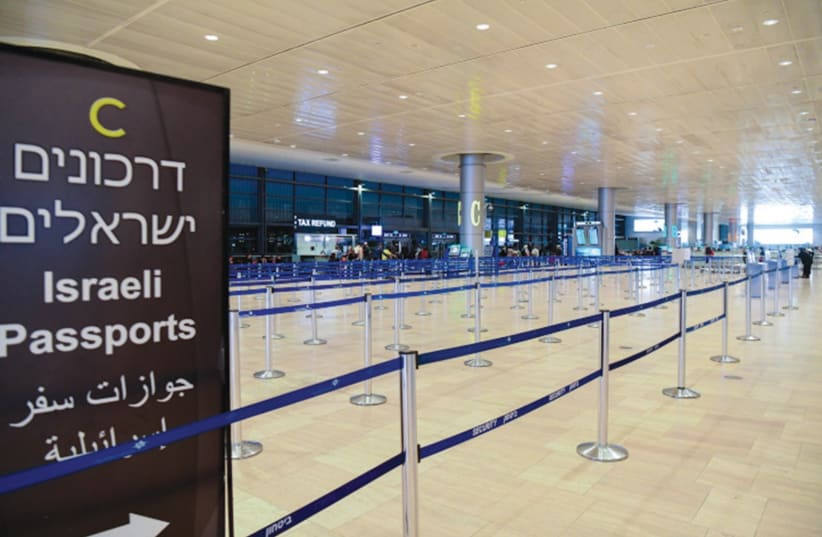Hundreds of Israelis are stranded in South America, particularly in Peru, with few options to return to Israel as countries on that continent close their borders, flights are few and ticket prices are soaring, costing thousands of dollars.
One of them, Bar Levi, turned to Facebook to beg the Israeli government to help return its citizens.
“We’re afraid to get sick here,” he wrote, adding, “bring us home before it is too late for us.”
He explained that he was part of a group of post-army service Israelis who feared facing the coronavirus without resources in a foreign country.
“Once we heard that the coronavirus was spreading, we did everything we could to get out of Peru but could not find flights,” he wrote.
The few that did exist, from Brazil to Israel, cost about NIS 14,000.
“We’re begging you [the Israeli government] to help us get to Israel. We are afraid to be quarantined in a foreign country, that is a Third World nation without the appropriate medical equipment and the advanced medical care that exists in [Israel].”
One Israeli, Ella Kostiner, who spoke with The Jerusalem Post by phone said she and her friend were able to leave Peru for a $2,000 ticket to Brazil, with a layover in Chile. The airport in Peru was “packed” and all flights were being cancelled. Kostiner said she simply looked for any flight that was leaving, irrespective of where it was heading.
“We looked country by country and there was no place to go,” she said.
In Peru, she said, no one can go on the streets, food is limited and there is a fear of violent outbreaks.
Kostiner spoke to the Post from the airport in Chile waiting for the Brazil leg of the flight, not knowing what awaits her when she arrives or if she would be able to head back home from there. To the best of her understanding, she said, Brazil is the last country from where flights are leaving South America.
The Foreign Ministry said its representatives abroad along with its consular wing “have mobilized” to help Israelis abroad as much as possible return home. But it did not speak of concrete steps it had taken to bring them back.
Diesenhaus director Mark Feldman, who is also a columnist for the Post, said his travel company has chartered an El Al Dreamliner with 260 seats to bring stranded Israelis home from Lima Peru at $2,500 a ticket.
He suggested that Israelis in Brazil should look for flights to the US, if they have a visa or Toronto if they don’t have a US visa. El Al and United Airlines, he said, are still flying to Israel. Turkish and Russian airlines are also flying to Israel. London is also a possibility, he said, but suggested avoiding Europe, because of lack of flights to Israel.
“I could promise that 95% of these kids got there [Latin America] via Europe but 100% will not be coming back that way,” Feldman said.
“The problem is that because it is so dynamic, things change so rapidly, literally day to day,” Feldman said.
On Monday Peru's government deployed masked military personnel to block major roads in Lima on Monday, while police restricted the movement of people as the country rolled out a state of enforced "social isolation" to slow the spread of coronavirus.
Countries around South America, including Argentina and Chile, are closing their borders to non-residents amid fears the virus could take hold in the region in the same way it has in parts of Asia and Europe.
Chilean President Sebastian Pinera said on Monday his country, which has 155 confirmed coronavirus cases, would close its borders to foreigners starting on Wednesday.
In Lima, troops wearing helmets and carrying weapons, stationed themselves on the Paseo de la República avenue, a key artery into the city center, to stop vehicles, with police officers only allowing emergency and medical vehicles through.
Peruvian President Martín Vizcarra on Sunday night announced a 15-day state of emergency amid the total closure of the country's border. Peru has 86 confirmed cases.
The copper producer has suspended constitutional rights such as free movement and assembly, though the government has assured it will guarantee the operation of supermarkets, pharmacies, banks, basic services and the transport of merchandise.
"We have to halt things to avoid the exponential curve of the coronavirus," Peruvian Defense Minister Walter Martos told local TV station América Televisión.
Reuters contributed to this report
